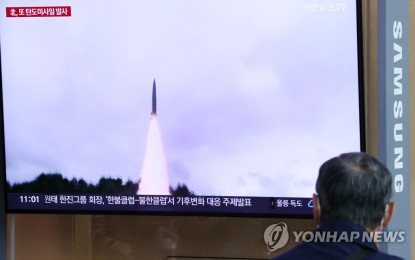
This file photo, taken Oct. 9, 2022, shows a news report on a North Korean missile provocation being aired on a TV screen at Seoul Station in Seoul. (Yonhap)
SEOUL – North Korea fired two short-range ballistic missiles (SRBMs) toward the East Sea on Monday, said the South Korean military.
The move was made a day after South Korea and the United States staged joint air drills, involving B-1B bombers, in response to the North's long-range missile launch.
The Joint Chiefs of Staff (JCS) said it detected the launch from the Sukchon area in South Pyongan Province between 7 a.m. and 7:11 a.m., and that the missiles flew some 390 kilometers and 340 km, respectively.
Hours after the launch, the North's official Korean Central News Agency (KCNA) reported that the artillery unit of the Korean People's Army fired two shots from the 600-mm multiple rocket launcher during firing drills and that they flew 395 km and 337 km, respectively.
The weapon system is a "tactical nuclear attack means boasting of the great might powerful enough to assign only one multiple rocket launcher with four shells so as to destroy an enemy operational airfield," the KCNA said in an English-language report.
In a ceremony to "present" the 600-mm rocket launcher at a key party meeting in late December, the country's leader Kim Jong-un called it an "offensive weapon" capable of carrying tactical nuclear warheads that could put all of South Korea within its range.
Some observers here noted that given their flight distance, the rockets fired Monday can reach a South Korean air base in Cheongju known to be home to the South's F-35A stealth fighters. Cheongju is located 112 km south of Seoul.
The KCNA took issue with the allies' stated plan to increase the "frequency and intensity of deploying U.S. strategic assets" to Korea.
The South's military "strongly" condemned the North's latest missile launches as an act of "significant provocation" that harms peace and stability not only on the Korean Peninsula but also in the international community.
It also called the provocation a "clear" violation of U.N. Security Council resolutions and urged the North to immediately stop such provocative acts.
"Our military will ensure a firm response posture based on security cooperation among the South, the United States and Japan, and maintain a firm readiness posture based on capabilities to respond overwhelmingly to any North Korean provocations," the JCS said in a text message sent to reporters.
It is rare for the South Korean military to mention security cooperation with Japan in a press message on a North Korean missile launch -- a sign of Seoul's move to strengthen bilateral defense ties in the face of growing North Korean threats.
The U.S. Indo-Pacific Command reiterated America's "ironclad" security commitments to the South and Japan.
"The missile launches highlight the destabilizing impact of the DPRK's unlawful (weapons of mass destruction) and ballistic missile programs," the command said in a release, referring to the North's official name, the Democratic People's Republic of Korea.
On Sunday, the allies carried out the air drills, involving the U.S. bombers and South Korean F-35A stealth jets, as the North launched what it claimed to be a Hwasong-15 intercontinental ballistic missile (ICBM) the previous day.
Kim Yo-jong, the influential sister of North Korean leader Kim Jong-un, issued another sharp-tongued threat of "corresponding" actions against the allies' military drills.
"The frequency of using the Pacific as our firing range depends upon the U.S.," she said in an English-language statement carried by the KCNA.
In the statement, she also expressed displeasure over South Korean experts having raised questions over the North's ability to conduct a "surprise" ICBM launch, its atmospheric reentry technology and other ICBM-related capabilities.
"We have possessed satisfactory technology and capability and, now will focus on increasing the quantity of their force," she said. "They had better rack their brains to make measures to defend themselves instead of doubting or worrying about other's technology."
She added the North is "carefully" examining the impact of the deployment of U.S. strategic assets on its security, vowing to "take corresponding counteraction" if the move is judged to pose any "direct or indirect" threat to the North.
The allies are scheduled to hold a tabletop military exercise against North Korean nuclear threats this week and their springtime Freedom Shield exercise next month. (Yonhap)
